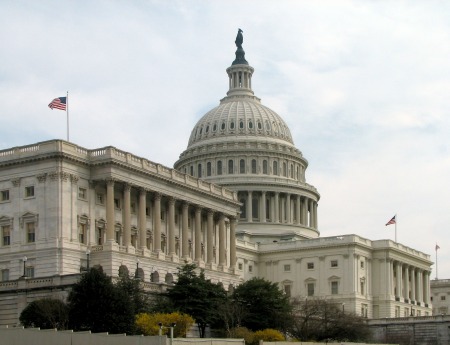GAO: Congress Needs to Define USAGM Firewall
Also recommends ending CEO authority to unilaterally replace grantee board members

The smarter way to stay on top of the multichannel video marketplace. Sign up below.
You are now subscribed
Your newsletter sign-up was successful
The Government Accountability Office (GAO) is concerned about the power of the CEO of the US Agency for Global Media (USAGM) and is recommending Congress consider no longer allowing that CEO to unilaterally appoint or remove board members of the six broadcast networks it oversees.
GAO is also recommending that Congress define the firewall between USAGM (formerly the Broadcasting Board of Governors) and those networks--and what is unacceptable interference with their editorial independence.
Also: Trump Seeks Cuts to International Media Funding
That is according to a new GAO report requested by Congress as it took steps to reverse some of the decisions of Congress during the Administration of President Donald Trump to centralize USAGM control under a CEO, rather than a board.
USAGM oversees government-funded independent news outlets providing info to countries where press freedom is problematic. Those outlets include the iconic Voice of America, whose news President Trump attacked at one point as "disgusting."
In pushing for funding cuts for international broadcasting, the White House under Trump said that it had concluded that "information statecraft and public diplomacy programs by the U.S. Government have been tepid, fragmented, and not fully effective in countering the exploitation of information by U.S. rivals." The Administration had said it didn't want to continue to fund projects whose effectiveness was unknown and whose efforts were not coordinated across government agencies.
While the White House suggested it was about oversight and getting the most bang for the buck, critics saw it as a way to move the services from unbiased news to pro-U.S. propaganda.
VOA and the other outlets were formerly overseen by the Broadcasting Board of Governors in collaboration with a CEO, but the President moved to the CEO-led model.
The networks at issue are "federal broadcasting networks"—Voice of America (VOA) and Office of Cuba Broadcasting and three non-federal networks that get government grants--Radio Free Europe/Radio Liberty (RFE/RL), Radio Free Asia, and Middle East Broadcasting Networks.
Congressional calls for the GAO were also prompted by allegations that, under the Trump model, there were ongoing threats to the networks' editorial independence. The President appeared to be unhappy that the networks were not promoting the U.S. even though their charter is to report news of interest to those countries that they may not have access to otherwise, not to propagandize or politicize.
GAO pointed out that then Senator Joe Biden said that the U.S. International Broadcasting Act of 1994 created the "firewall" by recognizing that journalists and broadcasters need to remain independent to produce balanced and unbiased work product, including that "U.S. international broadcasting be conducted in accordance with the highest professional standards of broadcast journalism" and that it "include news that is consistently reliable, authoritative, accurate, objective, and comprehensive."
The smarter way to stay on top of the multichannel video marketplace. Sign up below.
Contributing editor John Eggerton has been an editor and/or writer on media regulation, legislation and policy for over four decades, including covering the FCC, FTC, Congress, the major media trade associations, and the federal courts. In addition to Multichannel News and Broadcasting + Cable, his work has appeared in Radio World, TV Technology, TV Fax, This Week in Consumer Electronics, Variety and the Encyclopedia Britannica.

